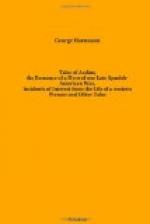My Mexican friends decided to give a farewell party in my honor. Accordingly they made great preparations. They secured the largest sala, or hall, in the township and scoured the country for musicians—fiddlers and guitar players. Every person of any social notability was invited. They drew the line of social respectability at peons, or bondmen. This was a happy-go-lucky caste of people who possessed no property nor anything else, and consequently they had no cares and were under no responsibility of any kind, as the wealthier classes, who virtually owned them, had to provide for their necessities. The system of peonage in New Mexico had been abolished with the abolition of slavery in the United States, but the peons did not realize the wretchedness of their deplorable social status, and in their ignorance they regarded their bondage as a privilege, believing themselves fortunate to have their wants provided for by their patrones. They were treated kindly by their masters and looked upon as poor relations and intimate but humble friends.
The entertainment was to be of the velorio (wake) type, which begins as a prayer meeting and ends in a dance. My friends exerted themselves to the utmost to make this event the social climax of the season. They sent a committee to the pueblo of Isleta for several goatskins full of native wine, and incidentally they borrowed San Augustin, the pueblo’s famous image saint, who they intended should preside over the velorio. As this prayer meeting was to be in my honor and for the sake of invoking the protection of the saints on my journey, they thought it best to procure San Augustin, who being the patron saint of the heathen Isleta Indians, would not mind giving a heretic Protestant gringo a good send-off, as he was accustomed to deal with heresy. They also procured a dozen fat mutton sheep, which were to be barbecued and served with chile pelado to the invited guests, surely a tempting menu and hot! The ladies baked bollos, tamales and frijoles. Melons and cantaloupes were brought in by the cartload. I was waited upon by a committee and received a formal invitation; for everything was done in grand Spanish style. When I arrived at the festive hall the ceremonies began. The ladies knelt before San Augustin, praying and chanting alternately. I took my customary station at the door, as master of the artillery. At the singing of a certain stanza and after the words, “Angeles, y Seraphim es! Santo! Santo! Santo!” I received my cue from one of the deacons who gave the order: “Fuego, maestro!” and I discharged my double barreled shotgun and a brace of six shooters in lightning-like succession. Surely this was pious devotion, properly emphasized, and it kept San Augustin from falling asleep. I used up a pound of gunpowder that night, and this was said to have been the grandest, most successful velorio ever held in that part of the world. At eleven o’clock I announced that my battery was overheated and too dangerous to reload, which stopped the praying and the grand baile began. There were several hundred dancing couples, who enjoyed themselves to the utmost until sunrise, and nobody thought of leaving for home until everything eatable and liquid was disposed of.




